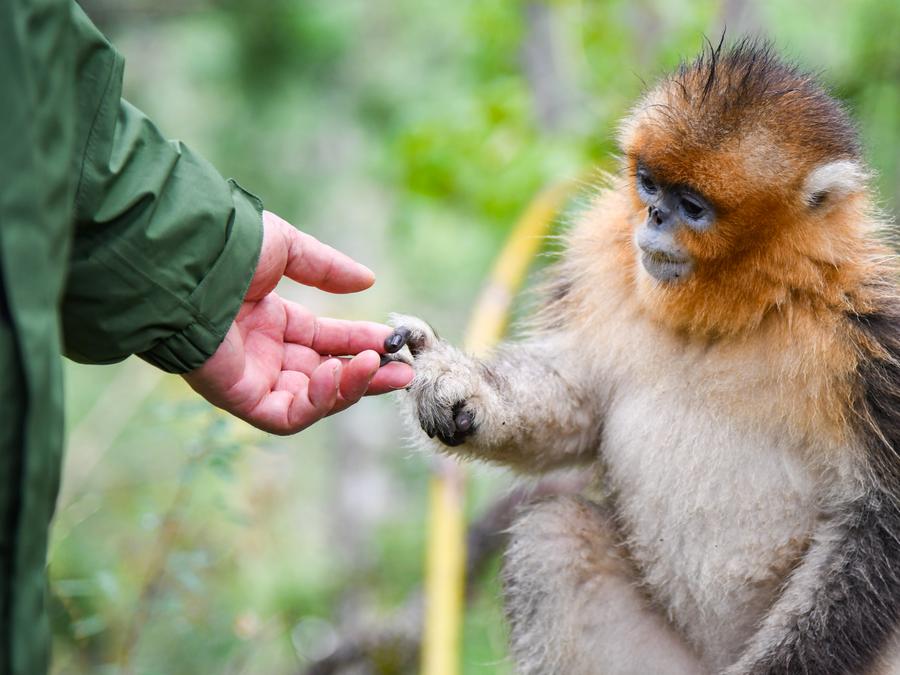Chinese scientists create monkey blastoids, boosting regenerative medicine
Source: Xinhua | 2025-03-12 | Editor:Ines

Tang Yulin, a forest ranger, interacts with a Sichuan golden snub-nosed monkey, in Baihe National Nature Reserve in Jiuzhaigou County, southwest China's Sichuan Province, Oct. 11, 2024. (Xinhua/Wang Xi)
Chinese researchers have achieved a significant breakthrough by efficiently creating monkey blastoids using stem cells, paving the way for new advancements in regenerative medicine, as reported on Monday by Science and Technology Daily.
Blastoids, a specialized structure derived from the in vitro induction of pluripotent embryonic stem cells, mimic the early stages of embryonic development. They serve as vital models for studying embryonic development and hold great promise for applications in regenerative medicine.
A research team from the Kunming University of Science and Technology, located in southwest China's Yunnan Province, has made remarkable progress by generating blastoids using monkey-induced pluripotent stem cells and somatic cell nuclear transfer embryonic stem cells.
The success rate for forming these blastoids reached an impressive 80 percent, with cells from older monkeys achieving a 60-percent success rate. This breakthrough offers a unique perspective on tissue regeneration in aging individuals -- shedding light on cellular reprogramming and tissue regeneration mechanisms during the aging process.
In addition, the research team developed an innovative biomaterial-based microfluidic platform capable of producing size-adjustable, degradable blastoid capsules at a remarkable rate of 4,000 capsules per hour.
These capsules provide a stable three-dimensional structure and significantly enhance the efficiency of fallopian tube delivery, laying a solid foundation for future clinical applications.
This engineered production method ensures that the creation of blastoid capsules is both standardized and scalable -- making their practical use more feasible.
Despite these advancements, the team acknowledged that further optimization is needed, particularly in improving the functionality of trophoblast cells within the blastoid capsules.
Future research will focus on refining culture conditions, developing advanced materials, and exploring the long-term developmental potential of blastoid capsules in vivo.
These efforts aim to enhance the performance of blastoid capsules, enabling them to more accurately mimic natural embryo development and provide better models for embryonic research.
This achievement not only offers new tools for studying embryonic development but also opens exciting avenues for regenerative medicine and disease research.
As technology continues to evolve, the efficient engineering of blastoid capsules is expected to play a pivotal role in future biomedical research and preclinical applications.
The study has been published in the journal Nature Communications.
You May Like
-
Snub-nosed monkeys seen at Baima Snow Mountain National Natu...
The black-and-white snub-nosed monkey, also known as the Yunnan golden hair monkey, is a national first-class protected animal of China. The species is also on ...
InKunming 2025-03-12 -
Yunnan villagers make the most of monkey business
As December arrived, Huang Qibang and his wife Wang Juxiang looked forward to a bustling time in their village in the southwestern part of Yunnan province.
InKunming 2024-02-01 -
Prominent results achieved in protecting Yunnan golden monke...
With a trendy Mohawk hairstyle, snub nostrils, and plump pink lips, the Yunnan golden monkey, also known as the "Snow Mountain Elf," shines as the most dazzling...
InKunming 2023-11-22 -
China's Yunnan reports over 3,800 golden hair monkeys
Southwest China's Yunnan Province has achieved remarkable results in the conservation of Yunnan golden hair monkeys as its population increased to more than 3...
InKunming 2022-08-09 -
Yunnan snub-nosed monkey receives a warm welcome
Yunnan snub-nosed monkeys come in from the cold to a warm welcome, as researchers and local hunters-turned protectors devote the study and protection of the e...
InKunming 2022-06-07 -
Yunnan snub-nosed monkeys come in from the cold to a warm we...
On April 8, 2015, Wang Bin, 43, from the Gaoligong National Nature Reserve and Gao Ge, a graduate student from Southwest Forestry University started climbing th...
InKunming 2022-05-26 -
Rare leaf monkeys spotted in Yunnan
A group of Phayre's leaf monkeys were recently spotted and captured on camera in a nature reserve in Southwest China's Yunnan province, sources with the reserve...
InKunming 2022-05-11 -
Phayre's leaf monkey family in Longling welcomed a baby monk...
A golden baby monkey was born to the Phayre's leaf monkey family in Guchengshanzi Reserve in Baoshan City, Yunnan Province.
InKunming 2022-03-31 -
Rare images revealing carefree life of a Phayre's leaf monke...
Photographers have captured images of the rare sighting of a Phayre's leaf monkey family with their newborns in a nature reserve in southwest China's Yunnan Pro...
InKunming 2022-03-04 -
Yunnan snub-nosed monkey family in Baima Snow Mountain got a...
Recently, in the Baima Snow Mountain National Nature Reserve, Shangri-La, the “Qige” family of Yunnan snub-nosed monkeys had a baby in the Year of the Tiger. ...
InKunming 2022-02-25







